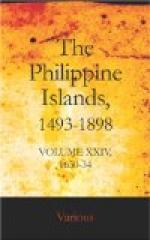With the advent, then, of the year 1605, in the latter days of April, our fathers assembled in the islands, as is the custom. On the Friday before the third Sunday after Easter, our father Fray Lorenzo de Leon went to take over the presidency by virtue of his letters-patent, and they were found to be such as were required. In consequence, he was received as president of that chapter, over which he presided, not only as president, but as vicar-general. The election resulted in [the choice of] his person, as above stated. In it, the first definitor was father Fray Juan Bautista de Montoya; the second, father Fray Esteban Carrillo; the third, father Fray Pedro de Aguirre; and the fourth, father Fray Roque de Barrionuevo. Father Fray Miguel de Sigueenza had the vote for president in this definitorio, and as visitors were elected father Fray Mateo de Peralta [10] and father Fray Francisco Serrano. All assembled, they ordained and enacted the acts that they judged advisable in accordance with that time. All those acts show the sincerity of those who enacted them, and they provided not only for the welfare of the order, but for that of the native fathers under our charge; for surely, under our shadow they increase and are sheltered. And if religious were lacking, what would become of them? Beyond doubt they would be like the wretched boat exposed to the fury of the winds, which has no greater security upon the waters than where the winds choose to carry it. For this one orders them, that one petitions them, and another one seizes and knocks them about; but with the protection of the religious they are free from all these annoyances. Very conformably with this, religious were established in the missions in order to teach them and often to protect them.
Our father provincial entered upon the exercise of his office with the same wisdom and prudence as in his first term, attending to it with all his might. However, his second term was not apparently so successful as the first—caused perhaps by various casualties, which have no place here, and do not affect the matter at all. In short, the affair was running badly and the body of the province was becoming laden with humors. I well believe that our father knew it all, and that he could have been less rigid, and that without dividing the forces that were forming. He thought that they were religious, and he the superior; and that all dissent, however violent, would be only murmur—just like certain huge clouds that predict great storms, but finally and at the end, the entire storm is expended in clouds of dust, thunders, and lightnings, so that that storm ends with only noise. But such did not happen here, but the matter went farther; and the father definitors, within one and one-half years, after meeting, deposed our father Fray Lorenzo de Leon. They sent him to Espana; but he remained in the province of Mejico, without wishing more than to serve our Lord, and ended his days there, as one may understand of so renowned a




